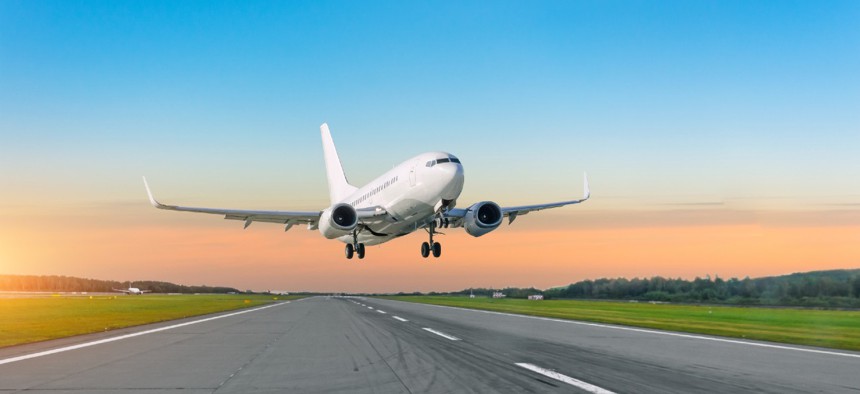
aapsky / iStock.com
Watchdog: Federal Air Marshal Service Should Better Address COVID-19 Documentation and Testing
The agency did take steps to protect its workforce, GAO said.
The Federal Air Marshal Service should better document its coronavirus protocols and help employees access testing, according to a federal watchdog.
The Government Accountability Office published a report on Wednesday about how the Federal Air Marshal Service, a division of the Transportation Security Administration, handled the pandemic. The majority of the FAMS workforce (88%) is air marshals and management officials, while 13% is support staff, said the watchdog. While travel for the public slowed for the first year of the pandemic, that was not entirely the case for air marshals.
“Public health officials have recommended social distancing and other steps to reduce the spread of the disease, but air marshals often work on planes where they cannot fully adopt these measures,” GAO said. “The CARES Act included a provision for GAO to conduct monitoring and oversight of the federal government's response to the COVID-19 pandemic,” which this report does.
Early in the pandemic, the number of flights the Federal Air Marshal Service covered decreased by 90% (compared to the monthly average), but by June 2020, the agency resumed its pre-pandemic flight levels. Also, while its coverage of international travel mostly stopped, the Federal Marshal Service covered more flights overall than it usually does and increased marshals’ presence at security checkpoints in airports and national events.
Beginning in January 2020, managers started to procure and distribute personal protective gear to agency staff. In February, face coverings were available to employees and then by May 2020, the TSA administrator required all employees to wear masks while on duty. Field offices also implemented various social distancing measures, said the report.
As for use of remote work, the service “generally has not allowed air marshals to telework, but starting in March 2020, Federal Air Marshal Service managers permitted and encouraged air marshals to telework when they did not need to be in the office,” the report said. “FAMS also took steps intended to prevent the spread of COVID-19 in its offices and facilities.”
In April 2020, the Federal Air Marshal Service and TSA established protocols for when an employee had a confirmed or suspected novel coronavirus case. However, the Federal Air Marshal Service “has not consistently documented their implementation,” and doing so would lead to better oversight and help the agency better assure employees and the public flying that it's taking consistent, public health precautions, said the report.
GAO also found the agency doesn’t routinely make testing available to employees, but rather recommends that employees get tested through their healthcare providers.
“Air marshals in all three field offices GAO met with either noted barriers to testing or benefits to improved access to tests,” said the report (there are 20 field offices in total). Although employees became eligible for coronavirus vaccines in January, “Centers for Disease Control and Prevention guidance says testing continues to be important even as vaccinations become available;” therefore, “by facilitating access to testing, FAMS could better ensure employee health and continued operations.”
GAO said it did not review the Federal Air Marshal Service’s vaccination rates, but as of March 4, 1,026 staff had received their first dose and 681 of them received both. TSA couldn’t comment on its specific number of federal air marshals for security purposes, but “it can be said that many thousands are dedicated to protecting and securing our nation’s transportation network and its travelers.”
The Federal Air Marshal Service had 345 reported coronavirus cases and one death, as of January 31, 2021. Among the cases, 234 were flying air marshals, 50 were supervisors and managers, 48 were non-flying air marshals, and 13 were support staff.
As a result of the investigation, GAO recommended that the executive assistant administrator or Federal Air Marshal Service director ensure that officials are consistently documenting the steps taken after confirmed or suspected COVID-19 cases and routinely make testing available to employees.
The Homeland Security Department, which houses the TSA, agreed with both recommendations and said the Federal Air Marshal Service would implement them by the end of June.
“While the pandemic persists, TSA’s mitigation efforts continue to improve as preventative resources, such as the availability of vaccinations become more readily available,” wrote Jim Crumpacker, director of DHS’ GAO-Office of Inspector General liaison office. “Likewise, lessons learned involving employee safety protocols and medical reporting have helped improve DHS processes for dealing with widespread health pandemics.”
GAO noted that it previously published a sensitive version of this report that contains information that cannot be made public, such as details on the Federal Air Marshal Service and data on the marshals.







